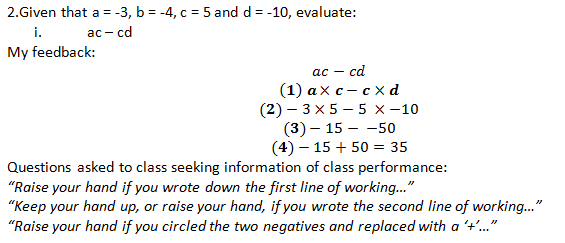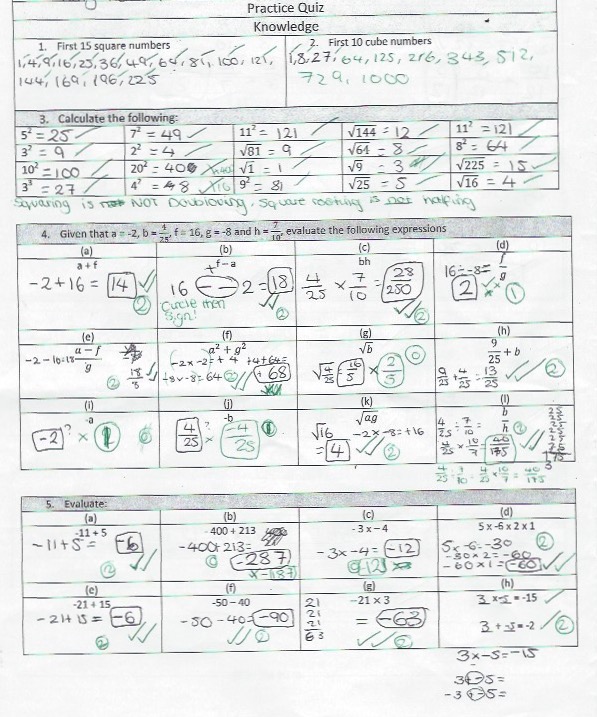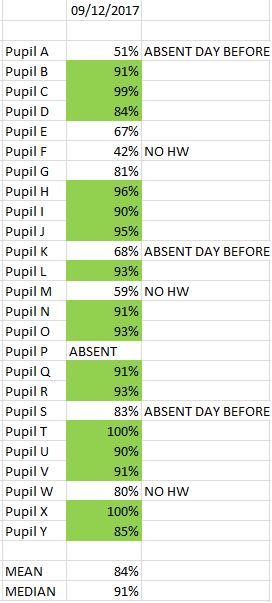In my last blog post I discussed how curriculum sequencing underpins successful teaching of concepts. For examples, ensuring that pupils are able to add, subtract, multiply, divide directed numbers as well as raise a directed number to a power allows successful teaching of how to substitute directed numbers into expressions.
The second aspect of good teaching is ensuring pupils are regularly given low-stake quizzes which test whether a pupil has retained the small body of knowledge that has been taught explicitly over a short period of time. This is possible through weekly quizzes. I learnt this good practice during my time at Michaela Community School, and it has been the second most important aspect of my teaching practice that has allowed my pupils to be successful in the classroom. The first being the introduction of in-house resources in the form of a textbook.
Why are weekly quizzes powerful?
- Testing is a form of learning which helps pupils retain new information
I didn’t think of testing in this way when I started teaching. I thought testing was a form of dead time which took up lesson time. There is some grain of truth to this because you don’t want to occupy a large proportion of your lesson time to testing because you want to teach pupils new content.
Where I was wrong in my understanding of testing is that when pupils are taught new content the only way pupils retain new information is through regular testing, this is the case by:
- Activating the information in regular, spaced intervals. The recall process needs to be an active one where a pupil responds to a question rather than re-reading or highlighting. Every act of recall and review of newly taught information the stronger the memory traces become. The stronger the memory the longer you are able to recall the piece of information.
- Testing a pupil’s understanding of a concept by creating a variety of test items. The greater the variety the more that pupil learns to connect new information with what they already know. This improves a pupil’s ability to retain information.
Equally, this is important because there is nothing more frustrating for a teacher, and a pupil, when a pupil has been taught a lot of information and then they forget it. This demoralises even the most competent of pupils to learn further.
- Weekly quizzes are a good measurement of a pupil’s change in performance
This is dependent on a few factors:
1.The content of the test items has all been taught to pupils. Or pupils have been taught sufficient information to answer the question. For example, I didn’t explicitly teach this problem type below to my Year 10s or Year 9s because I wanted to see if they could do it themselves given the information they already had. In both classes 95% of pupils were able to do both questions correctly.
2. The way that I have organised my weekly quizzes is similar to what was done at Michaela. I give pupils a practice quiz before I give them the real quiz. The real quiz’s score I will total and collate into a spreadsheet. The practice quiz is a similar version of the real quiz but with different numbers, the question types are the same. Pupils do this practice quiz in my lesson in exam conditions. I then mark the quiz with the class, giving whole class feedback. I ask pupils how many marks they got per question. For example:
This lets me know which pupils have made the most mistakes, which pupils have been the most successful, if I need to reteach a particular concept that the whole class has misunderstood or that I haven’t taught well.
They are then able to take the practice quiz home, and they are also given a spare copy of the practice quiz. So on one piece of paper, double sided:
- class practice quiz with teacher feedback in green pen
- black copy of practice quiz to reattempt at home
The pupils have teacher feedback to act on so when they are revising for the quiz the following day they know what they need to revise over. They understand their mistakes and they know how to avoid making those mistakes again. The following day pupils are given the same quiz but with different numbers. They complete this in exam conditions where I invigilate to ensure pupils don’t speak or cheat.
This works because the test items haven’t changed. I have changed the numbers that the pupils will substitute but the problem types are the same in the real quiz and practice quiz. The test has stayed constant so I can infer a judgement on pupil performance. You can’t compare test results when the quiz continues to change. Keep as many test variables the same, so the only variable that is measured is a pupil’s performance.
From the data set of the most recent weekly quiz my Year 9 Set 2 did I can then make the right judgement about each pupil’s performance.
What makes this practice difficult?
It depends on how many lessons you have with that class because you do need time to teach the curriculum and do both a practice quiz with feedback to give, and time for another quiz. I am very lucky to have about 5 lessons per week with my classes, and some double lessons too.
If you teach five year groups then it can be hard as a single teacher organising these quizzes. If this became a whole department policy then it would be best to have one teacher designing the weekly quiz for one year group. This is manageable. If one teacher makes the quiz catering for all ends then each individual teacher can edit to make it suitable for their classes.
I have only been at GYCA for a half term, but the quizzes are informing me of how I can improve my teaching, how clearly pupils understand what I have taught them, how flexible their knowledge is and how well they are retaining what they have been taught. The kids love seeing percentage scores in the 80 – 100% range. Pupils love seeing the success of their hard work. It motivates pupils who want to learn more to be able to do so because they have been told (a) what to learn and (b) how to do it too. It also gives pupils who are lazy or find maths difficult guidance on how to improve. I am looking forward to seeing the kids’ faces on Monday morning when they get their quiz scores back. Lots of them will be beaming with pride.








Leave a Reply
You must be logged in to post a comment.